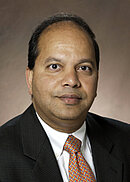Dinesh Katti, professor of civil engineering, was invited to give a plenary keynote lecture at the fourth Asia-Pacific Conference on Unsaturated Soils in New Castle, Australia, last November. The title of his lecture was “What's Up with Clay and Water Molecules? A View into Molecular Interactions and Molecular Responses in Swelling Clays.”
The conference was attended by leading researchers in the field of geotechnical engineering from around the world. The major theme of the conference was on the mechanics of moisture sensitive soils, such as clays. Such soils are susceptible to dramatic changes in engineering properties that can cause significant distress or even catastrophic damage to buildings, infrastructure, triggering landslides due to changes in soil moisture content. The field of unsaturated soils is becoming more important because of potential shift in weather pattern across the globe because of climate change.
Katti’s keynote address discussed a paradigm shift in understanding engineering properties of swelling clays from conventional to discernment of molecular behavior as being necessary for both fundamental understanding of clays and also design of structures on swelling clays. Kalpana Katti, Distinguished Professor of civil engineering, is the co-investigator on this research.
According to the researchers, swelling clays are found all around the world and in many parts of the United States, including North Dakota. "When these clays come in contact with water, they swell and exert swelling pressure if constrained from swelling. The swelling can result in lifting of light structures, pavements and moving retaining walls causing significant damage. Hillsides and slopes composed of such clays can slide because swelling also can result in loss of strength," Dinesh Katti said. "In the United States alone, the damage caused by these clays is estimated to be in excess of $8 billion each year."
Three NDSU doctoral students and two master’s students were involved in this research. Some of the findings from this research have been extended to polymer clay nanocomposites for use in structures, flexible electronics coatings and biomedical applications, and has resulted in a new “Altered Phase Theory” to explicate property enhancement in polymer clay nanocomposites. This research is funded by grants from the National Science Foundation with computational support from the Teragrid supercomputers and the NDSU Center for High Performance Computing.
